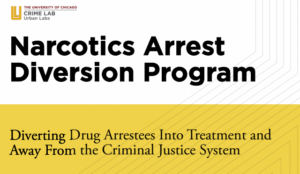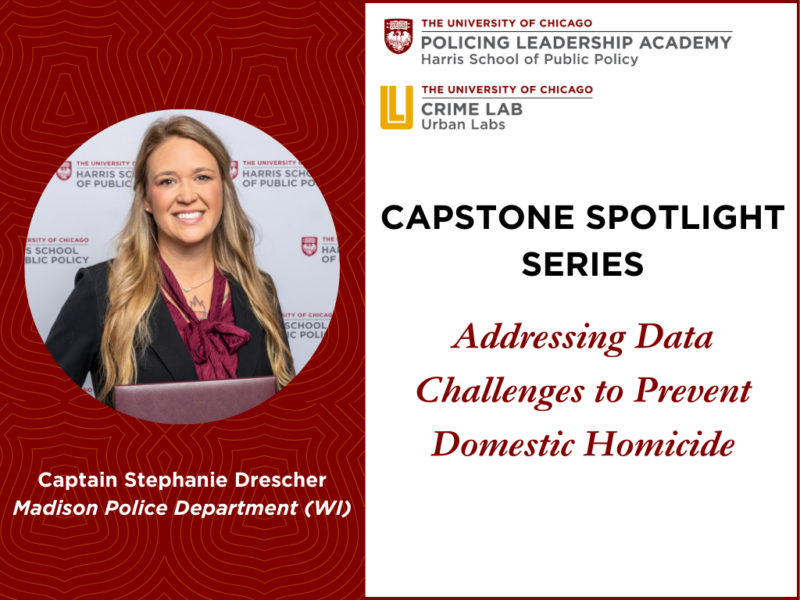Criminal Justice Reform
We’re advancing long overdue reforms to reduce the harms of America’s broken criminal justice system.
In cities across America, communities face high rates of gun violence and significant harm caused by the criminal justice system, which disproportionately impacts people of color. For too long, the public sector has failed to address these overlapping and systemic crises, partly because policymakers view them as a trade-off. But to truly increase public safety, society must find solutions that advance justice and reduce gun violence simultaneously.
That’s why we’re working with public sector agencies to reform our criminal justice system by designing pretrial risk assessment tools, studying the effects of cash bail, and promoting treatment instead of incarceration for individuals arrested on non-violent substance use charges.
Our evaluation of the Narcotics Arrest Diversion Program found participants were 44% less likely to be re-arrested for drug possession and violent crime charges.
We worked with Luminosity and the NYC Criminal Justice Agency to design and implement New York City’s pre-trial risk assessment tool, helping low-risk defendants avoid jail time while they await trial and helping judges avoid releasing high-risk defendants.
Illinois Department of Corrections’ (IDOC) Facilities Mapping Project
To improve access to college education opportunities in prison, the Crime Lab partnered with the Illinois Department of Corrections (IDOC) to produce interactive statewide maps to connect facilities with nearby postsecondary education providers.

New Jersey Portfolio
The Crime Lab is partnering with the New Jersey Administrative Office of the Courts (AOC) to help strengthen reforms to the state’s criminal justice system introduced in 2017, including eliminating cash bail and introducing a risk assessment tool to aid in pretrial release decisions.

Chicago Fire Department Technical Assistance
Crime Lab data analysts were embedded in the Emergency Medical Services (EMS) division of the Chicago Fire Department (CFD) to generate data dashboards and visualizations using data from patient care reports.

Targeted Interventions for High-Risk Domestic Violence Victims
The Crime Lab studied targeted approaches to identify high-risk domestic violence victims, conduct outreach, and provide resources to lower the risk of experiencing future harm.


Empirical Analysis of Prediction Mistakes in New York City Pretrial Data

Brookings Institution Commentary: Making the invisible epidemic visible
Using new data from a large urban trauma center in Chicago, we document substantial under-reporting of domestic violence at the time of receiving medical care.

Video about the Narcotics Arrest Diversion Program
This video provides an overview of the Crime Lab’s evaluation of the Narcotics Arrest Diversion Program, a program implemented by the community behavioral health provider Thresholds.

NADP Research Brief
Research Brief for the Narcotics Arrest Diversion Program.
Latest Updates
Addressing Data Challenges to Prevent Domestic Homicide
Stephanie Drescher is the Operations Captain, Executive Section at the Madison (WI) Police Department and a graduate of the 2023 inaugural cohort of the University of Chicago Crime Lab’s Policing Leadership Academy (PLA). Our Crime Lab team spoke with Captain Drescher to learn how her experience in the PLA has shaped her work at her home department.

Improving the quality of life in downtown Knoxville
Captain Sammy Shaffer is the Commanding Officer of the recently created Central District in the Knoxville Police Department and a graduate of the 2023 inaugural cohort of The University of Chicago Crime Lab’s Policing Leadership Academy (PLA). Our Crime Lab team chatted with Captain Shaffer earlier this year to hear more about how his experience with the PLA has shaped his work at his home department.

Chicago CEOs Raise $100 Million to Fight Crime After Bloody Days
Bloomberg’s Isis Almeida and Miranda Davis cite Crime Lab analysis of data on shootings in Chicago during the summer months, which account for more than one-third of the city’s shootings every year.

